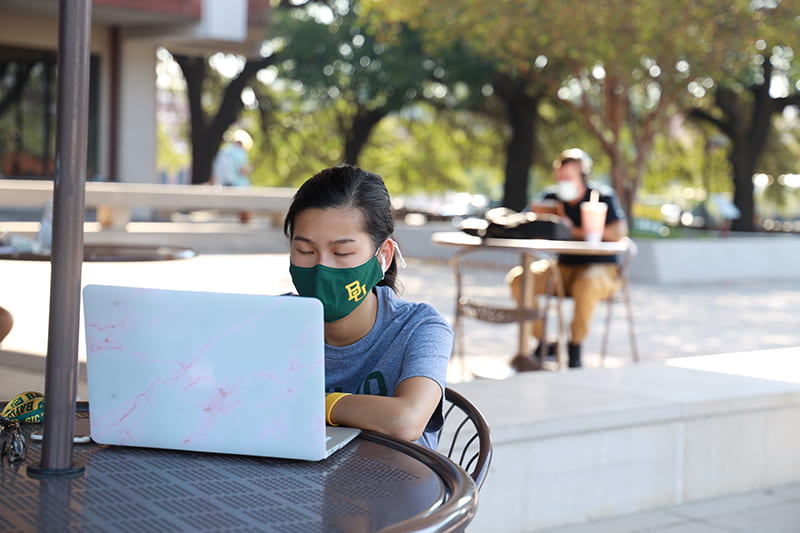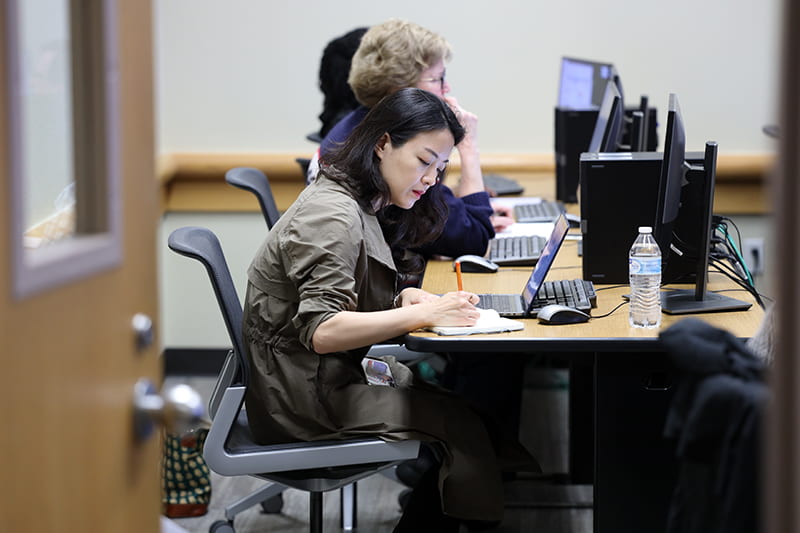
Baylor faculty learn about moving their coursework online during LATS training – Moody Memorial Library – 03/16/2020
The challenges brought on by the coronavirus pandemic impacted every aspect of Baylor University’s approach to education. From classroom instruction to how to handle the new normal for studying in Moody and Jones Libraries, the appearance of a global pandemic meant new areas for members of the Library and Academic Technology Services (LATS) team to implement new systems, expand services, and meet opportunities with expert assistance like never before.
From the end of the Spring 2020 semester through the summer to the first day of Fall classes on August 24 and beyond, LATS personnel worked tirelessly to support the University’s plan to provide hybrid instruction, online courses, in-person classroom upgrades and much more. Below, we outline some of the major accomplishments of the LATS teams. These efforts reflect collaborations with other Library units, the Academy for Teaching and Learning, the Student Success Center, Academic Technology Directors, ITS and others across campus. Despite uncertainty and time pressures, working together with these groups made it possible to achieve a complete campus retooling in a remarkably short period of time.
Learning Spaces
Installation of new recording and streaming hardware and software in more than 200 classrooms over a two-‑month period, including 60+ rooms that required ceiling cameras, programming, and configuration
This work facilitated the automated recording and uploading of classroom activity into the instructor’s Kaltura account, as well as accommodating Zoom or other synchronous two-way connections as the instructor desires. Each classroom installation was retrofitted to work with existing AV hardware in the room. See a full list of the upgraded rooms on the Learning Together website.
Initiation, management, and support of 3,400 recordings and 130 streams per week in outfitted classrooms
Class schedules were populated in Kaltura Classroom Capture so that automatic recordings would occur in these rooms. Streams were scheduled upon instructor request. These recordings are not available for students to view unless the instructor publishes them in Canvas, and the instructor can easily delete any undesired recordings. LATS staff can also re-initiate the upload in cases of failure due to the load on Kaltura’s service.
Response and assistance for over 660 classroom technology help tickets during the first 4 weeks of the semester (normal load for an entire semester around 600)
This exponential increase in the number of tickets to start the semester was primarily due to recording and streaming (one-way or two-way) activities in the classroom. Many instructors have been required to teach using new hybrid modalities to engage remote students or create content that can be provided to students who can’t attend class. Several of these tickets were related to Kaltura load issues, proper microphone usage, or recording verification at the start of class.
Replacement of 138 desktop systems in labs and public access spaces in the library and throughout campus
These replacements were part of the normal workstation replacement cycle. Additionally, LATS staff disabled 140 public access machines and placed appropriate signage on disabled computers before the semester to accommodate social distancing requirements.
Complete AV upgrade for 32 classrooms in the Baylor Science Building (BSB)
These upgrades were part of the campus planned replacement cycle for classroom technology.
Expansion of virtual desktop access to accommodate students with no or limited access to campus computer labs
Software packages such as SAS, JMP, SPSS, Matlab, and Nvivo were added to virtual machine configurations, and the number of concurrent virtual computers that can be used was increased to 40.
Deployment of Occuspace occupancy monitoring technology in Moody and Jones Libraries
Occuspace uses device counts to calculate and display current occupancy levels of library spaces. This information helps library employees monitor study spaces, and can help students find a space to work.
Experiential Learning Commons
Creation of Student Success Initiative laptop loan partnership
Staff prepared 200 laptops to be collaboratively loaned to students with academic and financial needs. Student Success reviews and approves requests, ITS images the laptops and supports the configuration, and the Library circulates the devices.
Creation of an iPad paperless grading initiative
Canvas teacher and student apps were added to the base loaner iPad image and made available to graduate teaching assistants. The initiative was started in response to requests to help faculty share the increased digital (paperless) load with their assistants.
Expansion of faculty/staff extended-use laptop loaner program
LATS tripled the faculty/staff laptop loaner program to accommodate faculty and staff teaching online and/or working remotely. Also, LATS significantly increased the number of webcams, microphones, and document cameras available for checkout to support online teaching and learning.
Expansion of Library OsoFast, interlibrary loan, and technology checkout services for students
LATS worked with University Library staff to arrange extension of on-campus and off-campus delivery of library technology and print materials to those students in quarantine, isolation, or impeded from campus access. LATS staff partnered with the Spiritual Life office and Campus Living & Learning to provide these extended services.
Creation of pop-up recording studios in the Libraries to accommodate the increase in production of multimedia course content
Staff added a lightboard studio, two document camera studios, and a Kaltura Capture studio (GRC Collaboration Plus) to support additional, specialized recording needs for asynchronous multimedia content. Library staff also use the doc cam studios to show special collections virtually.
Expansion of student access to Adobe Creative Cloud
The Library checkout pool of Adobe Creative Cloud named-users licenses increased by 100 so students in quarantine, isolation, or unable to access campus workstations may use Adobe software on their own computers/devices.

A student uses her laptop outside Moody Memorial Library on the first day of the Fall semester – 08/24/2020
Learning Systems
Upgrade of Respondus Monitor license to an unlimited usage license for test/quiz proctoring
After retiring the Proctorio proctoring software from campus-wide service, the use of Respondus Monitor as a Canvas-integrated test/quiz proctoring solution grew tremendously. To accommodate this usage growth more economically, LATS pivoted to an unlimited usage license. Respondus usage as of 9/23 is 17,955 unique users.
Deployment of REACHv2 captioning on the Kaltura system
This new captioning option provides significantly more accurate machine captioning, offensive and obscene language filtering, support for multiple foreign languages, and improved editing capabilities.
Migration of Webex access to remove Canvas portal requirement
The removal of Canvas-only access requirements for Webex now allows faculty and staff to use Webex as a standalone product, if Canvas integration is not desired.
Introduction of several new Canvas feature options
On June 1, a number of new Canvas upgrades were announced, as detailed in this news article.
Assistance with technology problem resolution for remote international students
Along with ITS, LATS staff has provided targeted assistance to the Office of Global Engagement in supporting faculty teaching international students remotely to insure they have access to the same technology resources as domestic students.
Learning Design
Development of the Learning Together website as an instructional resource for faculty
In collaboration with the Academy for Teaching and Learning (ATL), LATS staff developed a new website, Learning Together, to support faculty as they transitioned modalities for Fall 2020. The site was designed to walk faculty through the necessary decisions they would need to make as they prepared teaching in a new modality.
Presentation of PRESTOLite seminar series for faculty online course development
The series was held in June and attended by 19 faculty members from multiple disciplines across campus. The faculty learned key strategies for developing online courses.
Design and presentation of the Hybrid Learning Webinar for faculty
Led by LATS staff, this webinar addressed the planning and teaching of a concurrent hybrid course, focusing on important strategies and activities faculty should consider as they prepare to teach students who are both in‑person and online simultaneously.

Baylor faculty learn about moving their coursework online during training, Moody Memorial Library – 03/16/2020
Digital Library Services and Systems
Transitioning physical Library reserves materials to online access
Due to the elimination of Library print reserves for the fall semester because of print quarantine policies, LATS staff worked with faculty to transition their physical reserve materials online, which included addressing copyright issues, acquiring e-books, acquiring or identifying already available streaming video, digitizing print materials, and digitizing videos.
Deployment and faculty training for the Leganto course readings solution
Leganto is a course reading list solution that integrates with Canvas and enables instructors to manage their supplemental course readings independently without going through course reserves.
Temporary reinforcement of support staff for Kaltura to accommodate start-of-semester help ticket load
Staff members from the Riley Digitization Center volunteered to assist with Kaltura problem resolution thereby addressing the increased volume of Kaltura help tickets and providing assistance for a temporarily depleted LATS support area.
